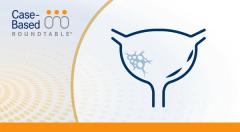
Surprising Findings With Nivolumab in Bladder Cancer Trials
Matthew Galsky, MD, discusses why some physicians were surprised at the positive outcomes of nivolumab trials in bladder cancer compared with trials of similar agents.
Episodes in this series

Matthew Galsky, MD, professor of medicine (hematology and medical oncology), director of genitourinary medical oncology, codirector of the Center of Excellence for Bladder Cancer, and associate director for Translational Research at The Tisch Cancer Institute at Mount Sinai in New York, discusses why some physicians were surprised at the positive outcomes of nivolumab (Opdivo) trials in bladder cancer compared with trials of similar agents.
In the phase 3 CheckMate 274 (NCT02632409) and CheckMate 901 trials (NCT03036098), patients with bladder cancer received adjuvant nivolumab in combination with ipilimumab (Yervoy) and chemotherapy vs chemotherapy alone and nivolumab alone vs placebo, respectively. Past trials of checkpoint inhibitors including atezolizumab (Tecentriq) and pembrolizumab (Keytruda) did not meet their primary end points. This led the community to believe nivolumab trials would turn out the same way, according to Galsky. However, this was not the case since both nivolumab trials reached their primary end point. For CheckMate 901, this may be due to the choice of chemotherapy.
TRANSCRIPTION
0:10 | In the CheckMate 274 and the CheckMate 901 studies, the results were encouraging, certainly in the adjuvant setting based on the fact that the first readout of an adjuvant trial with immune checkpoint blockade as a single agent was IMvigor010 (NCT02450331) and that didn't meet its primary end point. So it was encouraging to see that CheckMate 274 met its coprimary end points when that study read out, because we had heard not too long before that a similarly designed trial didn't meet its primary end points and there are some reasons why we think there might be a difference between the 2 trials.
0:49 | In the CheckMate 901 study, I would say that there were things that were both surprising and not surprising. I think the surprising things, similarly, were that the experience combining immune checkpoint blockade with platinum-based chemotherapy based on 2 randomized clinical trials reported before CheckMate 901 didn't meet their primary end points, and so there was a lot of pessimism about combining immune checkpoint blockade with platinum-based chemotherapy, based on those 2 studies: IMvigor130 (NCT02807636) and KEYNOTE-361 (NCT02853305).
1:17 | However, if one digs a little bit deeper and you look at the subset analyses from both of those prior phase 3 studies, one sees that there does seem to be a difference when immune checkpoint blockade is added to cisplatin-based chemotherapy vs carboplatin-based chemotherapy. Those prior trials included patients who received either cisplatin or carboplatin. CheckMate 901 was restricted to patients receiving cisplatin-based chemotherapy, and so if there was a difference in adding immune checkpoint blockade based on the specific platinum-based chemotherapy, one would have expected to have that confirmed in CheckMate 901, and that's indeed what happened. So when one added PD-1 blockade just to patients receiving cisplatin-based chemotherapy, then you did see an improvement in overall survival. So a little bit surprising, only because there was a lot of pessimism for the approach after IMvigor130 and KEYNOTE-361, but maybe in retrospect, not entirely surprising, because if one digs deeper into those prior datasets, then there is a hypothesis that was then tested and validated in CheckMate 901.
























